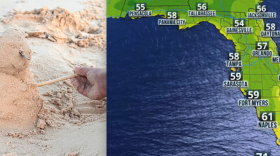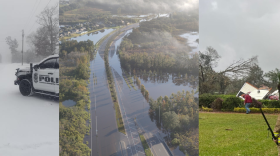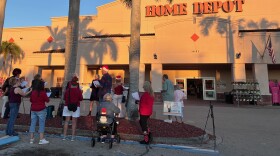It’s not too often that you can help the environment by doing nothing.
But that is true in one respect now that Lee County’s annual summer fertilizer ban is on, so put away the bag of turf builder until the restriction ends after September.
“Lee County does this to minimize the negative environmental impact effects of fertilizer runoff entering our waterways and unwanted excess nutrients in the waterways can lead to harmful algal blooms,” said Lisa Kreiger, the manager of the Natural Resources Department. “We all want clean water, and we all want healthy wildlife in our waterways.”
Homeowners and professional landscapers must not use chemical-based fertilizers from June 1 to Sept. 30.
That’s because this is the time of the year when Southwest Florida has the most rainfall. Too much chemical fertilizer, filled with nitrogen and phosphorus, can mix with stormwater runoff that carries the nutrients meant to feed your lawn into waterways.

Nitrogen and phosphorus is food for red tide and blue-green algae, in a way, because once those toxic algae blooms get started the professional-grade nutrients can “feed” the blooms and make them grow bigger and last longer than they otherwise might.
Nearly all of the coastal counties in peninsular Florida have fertilizer restrictions this summer for similar reasons.
Some counties may have programs or initiatives related to fertilizer management, including fertilizer banks where residents can exchange their excess fertilizer for more environmentally friendly alternatives.
In Florida, several counties have implemented fertilizer ordinances and related programs to address nutrient pollution, including Sarasota, Collier, Monroe, Miami-Dade, Broward, and Palm Beach counties.
Next month, last year, was the hottest July ever recorded in Fort Myers. So it wouldn’t be the worst thing to relax going into this summer.
But if you must fiddle with your lawn, you can in the following natural ways:
- Compost: Adding compost to your lawn enriches the soil with organic matter and nutrients. It improves soil structure, retains moisture, and supports beneficial microbial activity.
- Grass Clippings: Leaving grass clippings on the lawn after mowing can act as a natural fertilizer. The clippings decompose and release nutrients back into the soil.
- Organic Lawn Fertilizers: Use organic fertilizers made from natural materials like bone meal, blood meal, fish emulsion, and seaweed. These provide essential nutrients without the chemicals found in synthetic fertilizers.
- Mulching: Apply a layer of mulch around the base of your grass to help retain moisture, regulate soil temperature, and suppress weeds. Mulching also adds organic matter to the soil as it breaks down.
- Aeration: Aerate your lawn to reduce soil compaction and improve root growth. This allows water, nutrients, and air to penetrate the soil more effectively.
- Cover Crops: Plant cover crops like clover or ryegrass to improve soil health. These crops add organic matter, fix nitrogen, and prevent soil erosion.
- Proper Watering: Water your lawn deeply and infrequently to encourage deep root growth. This helps grass withstand drought and reduces the need for additional fertilizers.
- Soil Testing: Conduct a soil test to understand the nutrient levels and PH of your soil. This can guide you in making necessary ajustments with an organic material.
Kreiger, the manager of the Natural Resources Department, said not using fertilizers gives the waterways a break, too: "We all want clean water, and we all want healthy wildlife in our waterways."
Sign up for WGCU's monthly environmental newsletter, the Green Flash, today.
WGCU is your trusted source for news and information in Southwest Florida. We are a nonprofit public service, and your support is more critical than ever. Keep public media strong and donate now. Thank you.








